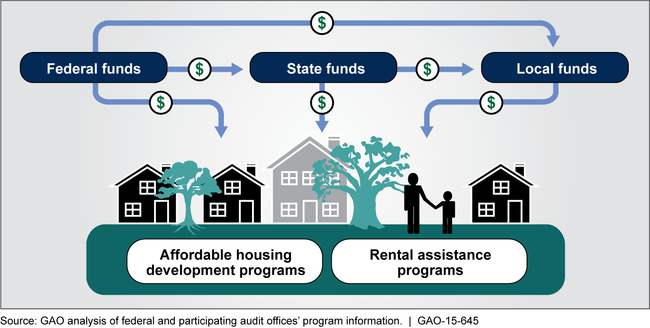Affordable Rental Housing: Assistance Is Provided by Federal, State, and Local Programs, but There Is Incomplete Information on Collective Performance
Highlights
What GAO Found
The federal government and state and local entities provide both rental assistance and affordable housing through a wide variety of programs. The six participating audit offices that conducted coordinated audits on rental assistance reported that the programs they reviewed were funded solely through one level of government or were funded by a combination of resources, as shown in the figure below. In February 2012, GAO found instances of fragmentation and overlap among federal rental assistance programs. In this review, GAO and the participating audit offices found indications of fragmentation and overlap among programs reported in Oregon and Washington.
Government Funding for Low-Income Rental Assistance and Housing Development Programs

The Rental Policy Working Group (RPWG), which was established in 2010 by the White House Domestic Policy Council to better coordinate federal rental policy, collaborates with state and local governments in multiple areas. The participating audit offices found that their government collaborated with other jurisdictions.
The Department of Housing and Urban Development (HUD), the Internal Revenue Service (IRS) and the participating audit offices reported on the performance of rental assistance programs to varying extents. HUD reported on its performance for only one of its two rental assistance strategic objectives, but IRS had not set goals or assessed the performance of the Low Income Housing Tax Credit. The participating audit offices reported that most jurisdictions had performance information at both the jurisdictional and program levels. However, without information on the government-wide performance of rental assistance, the Congress, decision makers, and stakeholders at all levels of government are hampered in their ability to set priorities and allocate resources. While complete and reliable information is a vital component of assessing effectiveness, GAO recognizes it is difficult to identify relevant federal, state, and local programs; collect performance information from multiple levels of government; and synthesize the information to reflect collective performance. HUD, the nation's leading housing agency, in consultation with the RPWG, is well positioned to capitalize on its existing collaboration among federal agencies and with state and local jurisdictions.
Why GAO Did This Study
The federal government, states, and localities play a significant role in providing rental assistance and developing affordable rental housing for low-income households.
This report (1) identifies the federal, state, and local government funded programs that provide rental assistance to low-income households and identifies indications of program fragmentation and overlap; (2) assesses the extent of intergovernmental collaboration for rental assistance; and (3) determines what is known about performance at the federal level, at selected state and local jurisdictions and for the collective performance of the levels of government providing rental assistance.
GAO partnered with 25 state and local audit offices to design an audit plan that 6 participating audit offices conducted on rental assistance to low-income households. GAO assessed the completed results, reviewed documentation, and interviewed officials from HUD, Treasury, and IRS.
Recommendations
GAO recommends that HUD, in consultation with the RPWG, work with states and localities to develop an approach for compiling and reporting on the collective performance of federal, state, and local rental assistance programs. HUD disagreed with the recommendation as originally drafted because it did not believe that it was addressed to the appropriate party. GAO agreed and modified the recommendation to direct it to HUD, in consultation with the RPWG. Treasury and IRS did not comment on the recommendation.
Recommendations for Executive Action
| Agency Affected | Recommendation | Status |
|---|---|---|
| Department of Housing and Urban Development | To build upon the Department of Housing and Urban Development and the Rental Policy Working Group's efforts to improve coordination of rental assistance, the Secretary of the Department of Housing and Urban Development, in consultation with the Rental Policy Working Group, should work with states and localities to develop an approach for compiling and reporting on the collective performance of federal, state, and local rental assistance programs. Such an effort may begin with one or more pilots to test approaches before they are considered for wider application. |
Executive Order 13878, dated June 25, 2019, established the White House Council on Eliminating Regulatory Barriers to Affordable Housing, which was charged with, among other things, working "across agencies and offices, with consideration of existing initiatives, to solicit feedback from State, local, and tribal governments . . . to identify ways to improve the data available to the public and private researchers" who evaluate the effects of regulatory barriers on affordable housing development. According to the Executive Order, the Secretary of HUD is the council's chair, and the council includes the Secretaries of Treasury, Interior, Agriculture, Labor, Transportation, and Energy as well as the Environmental Protection Agency's Administrator and White House officials. In December 2019, a HUD official said in addition to meetings among the principals, the council has held a number of public forums, including roundtable discussions with state and local officials to discuss regulatory barriers, construction, and land use. He also said the council is planning a roundtable on development finance and held a listening session on Native American housing issues. GAO agrees that the establishment of the council is a positive step and that the council's plan for reaching out to states and localities addresses the recommendation. This effort is expected to improve intergovernmental coordination of rental assistance programs, and allow the Congress, decision-makers, and stakeholders to evaluate collective performance data and provide a mechanism for setting priorities, allocating resources, and restructuring efforts, as needed, to achieve long-term goals.
|
